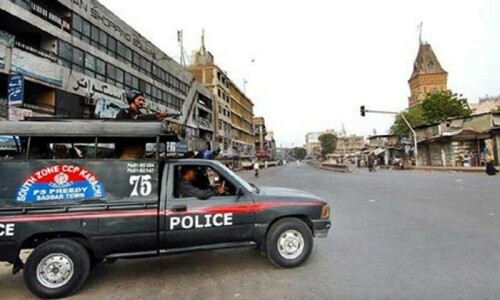KARACHI: An interesting discussion on Christopher Clark’s book ‘The Sleepwalkers: How Europe Went to War in 1914’ between consul-general of the Federal Republic of Germany Dr Tilo Klinner and his French counterpart Francois Dall’Orso shed light on the hazards of war and the importance of a lasting peace in the world at Habib University on Friday evening.
With reference to the book, Dr Klinner established at the outset that the author had discussed the war as a complex, difficult-to-analyse crisis. The conflict that began on June 28, 1914 turned into a catastrophe that resulted in the loss of 20 million civilian and military lives. A hundred years on, we needed to learn lessons from it.
Mr Dall’Orso said at the time there were quite a few powerful states, such as Germany, Britain and France. The war was basically a struggle for power and hegemony for which responsibility must be shared.
Dr Klinner said Christopher Clark in his book tried to find different avenues suggesting there were alternatives to the war. Though the assassination of Archduke Franz Ferdinand did play a role, it wasn’t the main cause; there were a multitude of factors. Pointing at the world map that served as the backdrop to the discussion, he said the world cut a different picture in the early 20th century. There were decaying empires (Hungary and Ottoman) while there were powerful states such as Germany and Britain. This meant a confrontation between ascending powers and the ones which were on the decline. Then there were the alliance systems between countries which could not be discounted, he said.
Mr Dall’Orso carried on with the alliance aspect of the war, saying even before World War I there were rivalries between nations because of which they would try and get into alliances with those countries which were not hostile to them. The assassination of Archduke Franz Ferdinand ignited a war between countries which were not friendly to each other. He reiterated that it was a struggle for power.
Dr Klinner came back to the different elements of the book and referring to the word ‘sleepwalkers’ argued that there were many people during the war who were not sleepwalking. There was the assumption that if you didn’t act, your opponent would attack you. Action was thought to be as a form of defence – a kind of preventive warfare.
Mr Dall’Orso mentioned that France and Germany had already fought a war in 1870. He said that in those days (late 19th century and early 20th century) politicians considered war as a legitimate means of resolving disputes.
Replying to a question, Dr Klinner said his grandmother had lived through the war. The enthusiasm that would be seen in the pictures of the conflict did not correspond with the reality. They had to go to war because of the logic of foreign policy. Mr Dall’Orso, too, talked about his mother’s father who was wounded in a gas bomb attack. This made Dr Klinner tell the attendees that weapons of mass destruction (WMDs) were first used in World War I. “The gas attacks were frightening,” he remarked, and added World War II came to an end with a nuclear WMD. He claimed that the present situation in Europe was relatively good as better cooperation systems were in place. Mr Dall’Orso was in consonance with his counterpart’s claim, saying in 21st century Europe there were daily contacts between leaders of nations, having a sense of responsibility towards peace. It was aristocratic governments that initiated world wars, whereas nowadays democratic dispensations were in place, he said.
The discussion, moderated by Dr Markus Heidingsfelder, was part of the European Film Festival Weekend titled ‘The Century of Upheaval’. In that regard, earlier two films were screened — Joyeux Noel (Merry Christmas), directed by Christian Carian, and Goodbye Lenin, directed by Wolfgang Becker.
Published in Dawn, September 27th, 2014












































Dear visitor, the comments section is undergoing an overhaul and will return soon.